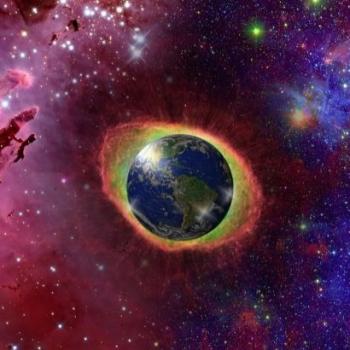A dialog about whether the Gods are infinite or not often begins with “Gerald Gardner wrote that the Gods of the Wica are ‘little gods.’” Yes, he did, but he was not very interested in abstract theology. I don’t think he was asserting that, if the Abrahamic God is infinite, then our Pagan Gods must be finite. Rather, his point was that, whereas (many) Christians believe in a God who is distant, arbitrary, angry, vengeful, and punishing, Witches believe in Gods who are nearby, kind, compassionate, supportive, and benevolent.
From an interfaith perspective, I have to say, as I often do about many aspects of religious belief, “It’s not that simple.” There is no single concept of an “Abrahamic God.” That is a vague umbrella term for a wide variety of concepts. Christians, Jews, Muslims, and other monotheists describe their ultimate deity in diverse and incompatible ways, and the diversity becomes even more diverse within those secondary umbrella terms. The gulf between the beliefs of liberal Anglicans and devout Evangelicals, between Hassidic and Reform Jews, between Sufis and Sunnis, cannot be glossed over and ignored. It is difficult to grasp how each of these wings can still consider the other wing to be members of the same religion, but they do. Or sometimes they don’t. But even though some conservative Christians still believe that “God punishes sins”—a belief that I consider to be primitive and pathological—liberal Christians believe in a God who is present here and now, forgiving, compassionate, protective, and definitely benevolent. So there is no contrast between Wicca and liberal Christianity on this issue.
The range of beliefs among Witches, and even more so considering all Pagans, is just as diverse. They range from belief that the Gods do exist and would exist even if we humans did not, a belief often catalyzed by an Awakening in which the Divine manifests as the Gods or especially the Goddess, all the way to the other extreme, of atheist Witches who believe there is no consciousness or intelligent life around here aside from humans—and not all of them, either. It is difficult for the theologically inclined (a minority indeed) to grasp how Witches or Pagans can consider themselves to be members of the same religion, or at least the same kinds of religions, when they have almost no beliefs in common. However, the sociologists say that, if people believe themselves to be members of the same or same kind of religion, then they are—whether that makes sense to outsiders or not. That principle, of simply recognizing one another as members of the same religion, was built into the charter that made the Covenant of the Goddess possible.
I am not trying to change the minds of people who simply (at least for now) cannot believe that any Gods exist at all. Rather, I hope to speak to those who are at least open to that possibility. A starting point is to ask what we would like Gods to be able to do for us. (I know. Don’t pray for what you merely want. That’s not the issue.) A God with whom we cannot communicate, whose existence we cannot know about, would be as useless for our lives as those possible multiverses before the Big Bang, outside this particular universe, that we can never communicate with (at least, not in the foreseeable future).
Religion is not abstract. It is personal. Religion, religious beliefs, do not exist outside of human consciousness. (Can you see why Gods would not have religious beliefs?) One can obviously describe religions as social structures, but it is equally true that there are as many religions as there are living human beings. That is, one cannot speak of religion impersonally. There cannot be an abstract argument that would prove that the Gods are infinite, or even that the Gods exist. There can be instead only a personal argument. I might also put it this way: it seems intuitively obvious to me that the Gods must be infinite. I find it puzzling why their infinitude would not be obvious to everyone else. Of course, having experienced what felt to me like their infinitude gives me a certain advantage or perspective or perhaps merely an assumption.
I also know that the mere concept of any sort of Infinite God sends people into a panic if they think that such a God must be like the “Old Testament Nobodaddy” whom Blake parodied. No, infinitude does not require any of those objectionable traits. One of my favorite Anglican theologians is J.B. Phillips, a colleague of Alan Watts. Among his many books is one titled Your God Is Too Small, in which he explicates the difference between the Very Big and the Infinite. It is thinking of God as Very Big that leads to those negative traits. An infinite divinity is very different.
The reason I think that any sort of God must be infinite is that some Higher Power seems to be doing the impossible for me. That is, I still have not taken the first drink after many years, and I know I’m not doing that myself. Let us suppose there could be a finite deity who could do what is humanly impossible. Doing the impossible must use up something like energy (even if not energy as in physics). A finite deity would have only a finite amount of that power. As humans continue to be fertile and multiply, spreading throughout the universe, their collective need for having the impossible done would at some time exceed that finite amount of power, and that finite deity would become useless. Why would one think that a “useless deity” is a deity at all? Hence the Gods must have unlimited power and must therefore be infinite. (That sort of thinking is known as a “thought experiment” or a reduction ad absurdum.)
I therefore think the phrase “finite deity” is an oxymoron with no real referent, like “square circle” or “green wind.” I think “evil deity” is oxymoronic also; I’ll deal with that later.
Okay, if there has to be an infinite deity, which one is it? Wrong question. As I said in an earlier blog, just in a simple mathematical model, there is an infinite number of infinite numbers. Likewise, there is not just one divine infinity; there is an infinity of divine infinities, an unending sequence of Gods and Goddesses. Each one is infinite; each one is unique. But which one is the ultimate reality underlying all the others? They all are; each one is the ultimate reality; each one underlies all the others.
Of course you cannot visualize how that works. We know our four-dimensional spacetime curves through a fifth dimension in order to be finite yet unbounded. We can’t visualize even five dimensions. An infinite deity is not five-dimensional; they are infinitely dimensional. And we do not have a pronoun for what is simultaneously One and Many.
Thus I cannot offer you a merely logical proof that or how the Gods are infinite. I can only tell you the vision that works for me. Visualize an infinite diamond, with infinite facets, like Hera’s faceted throne in Sappho’s verse. Whichever facet you focus on, pray to, worship, he/She/They will manifest to you as the Ultimate Reality. The Gods have no pride; that’s a human failing. They will come by whatever name they are called, as long as you call them. An infinite Divinity will always seem utterly paradoxical from any human viewpoint.















